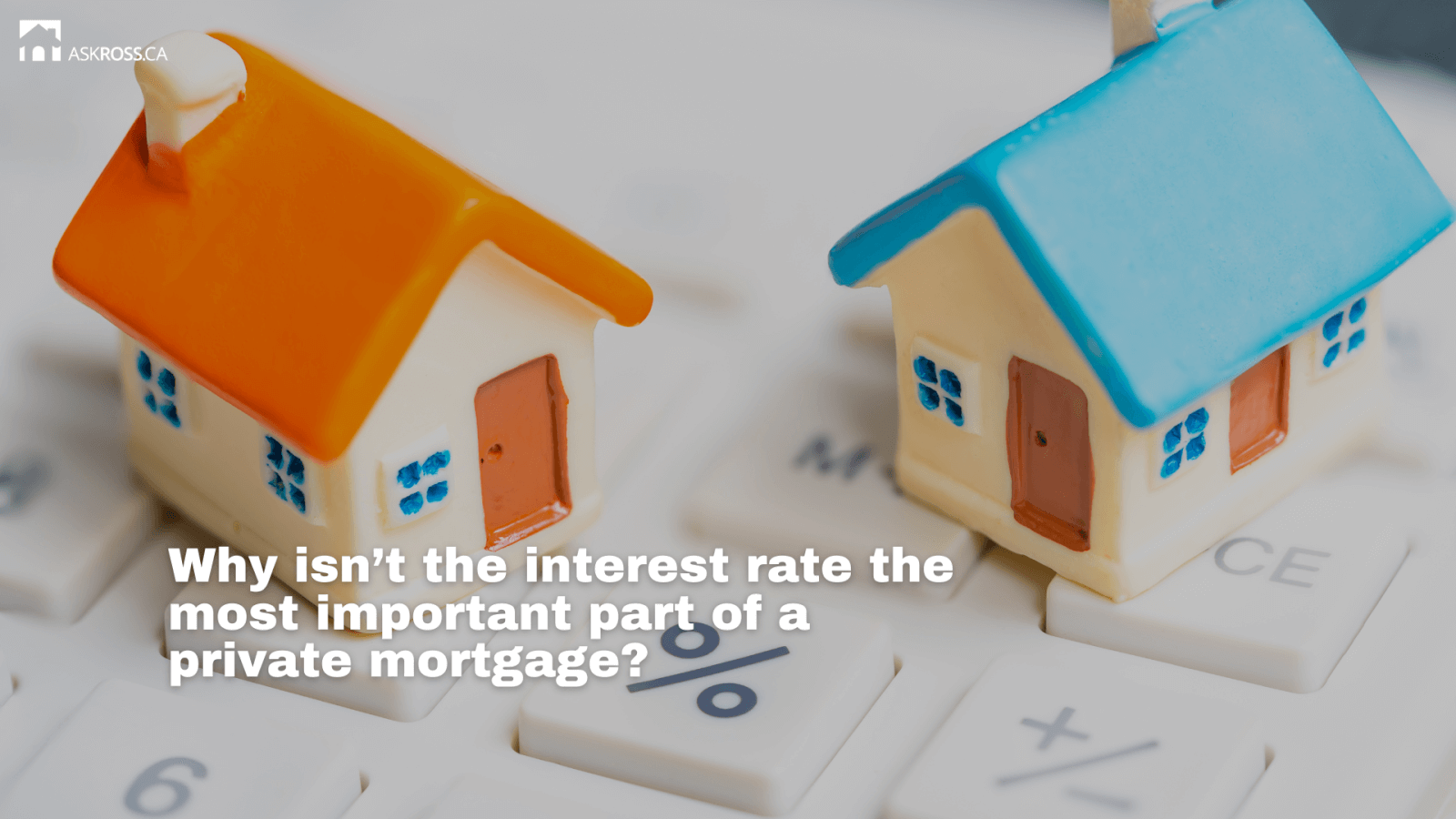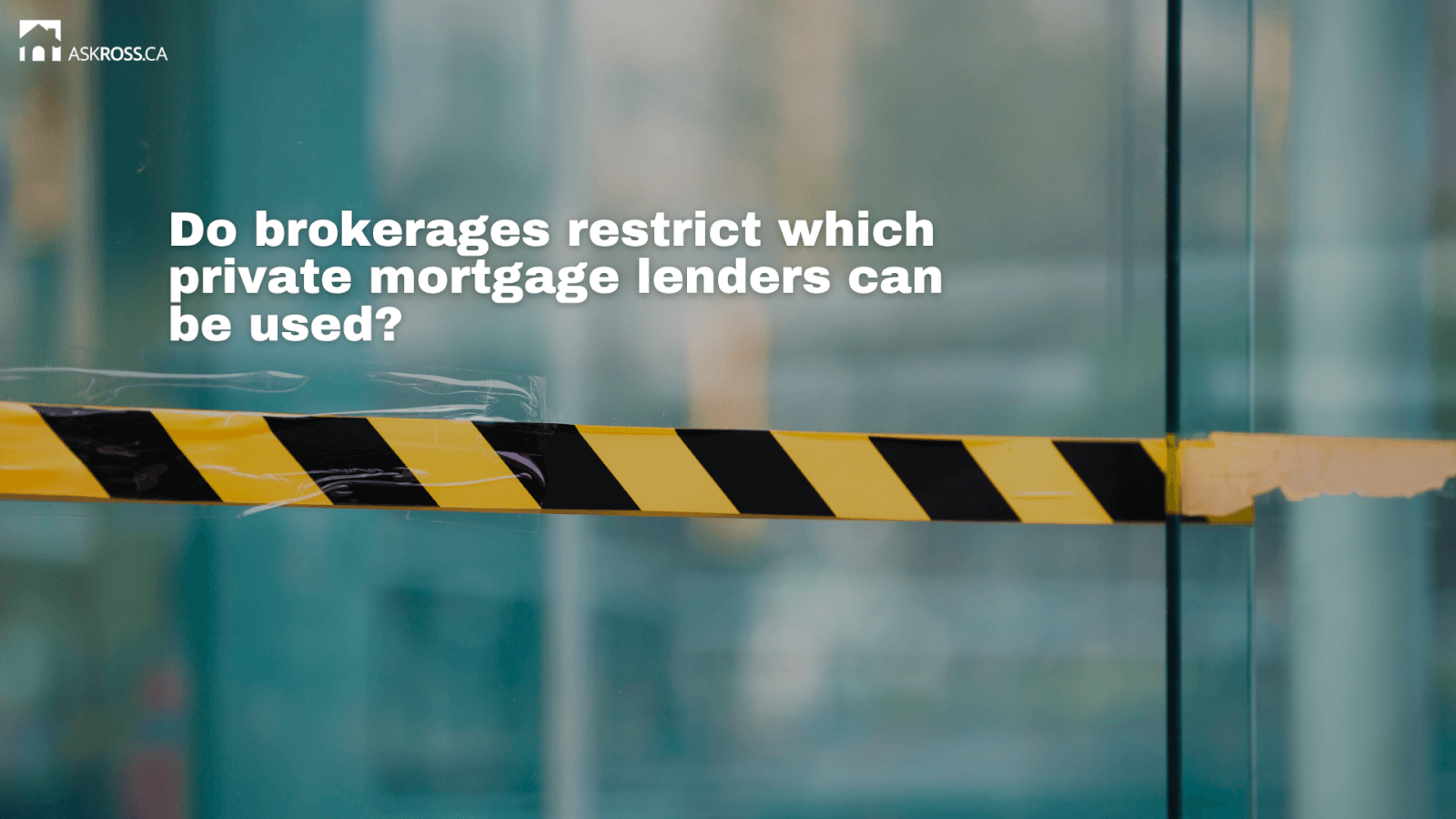
Published: April 4th, 2025 • Last Updated: April 4th, 2025
Author: Ross Taylor on AskRoss.ca
What Should I Ask Before Getting A Private Mortgage In Canada?
When most people start shopping for a private mortgage, their first question is almost always, “What’s the rate?” And look—I get it. That’s the number that sticks out. However, in the world of private lending, focusing on the rate alone is like judging a car just by the paint job. You’ve got to pop the hood and look deeper.
Private mortgages can absolutely be the right solution when the banks say no, but they come with unique conditions, costs, and risks that demand a different kind of due diligence. From how much it costs to get in to how painful it’ll be to get out, here’s what I look for—and what you should too.
Jump to a specific section in this article ↓↓
- How do I know if I’m working with a good private mortgage lender?
- What are the traits of good private mortgage lenders?
- What are the red flags to watch out for when choosing a private mortgage lender?
- Why isn’t the interest rate the most important part of a private mortgage?
- Do brokerages restrict which private mortgage lenders can be used?
- Frequently asked questions we hear about private mortgages
- Can I repay a private mortgage early?
- How do first-time buyers benefit from a 30-year mortgage?
- Do private lenders check credit?
- Are private mortgages safe?
- Advice From Ross Taylor Mortgages

How do I know if I’m working with a good private mortgage lender?
Let me be blunt: Not all private mortgage lenders are created equal. When your home is online, the quality of the lender matters just as much as the rate or terms. Some are professional, transparent, and fair. Others, not so much.
That’s why we only work with private lenders and Mortgage Investment Corporations (MICs) we know and trust—lenders who have shown flexibility, clear communication, and a willingness to work with clients if life doesn’t go according to plan.
On my Private Mortgage FAQs page, I explain that one of the biggest differences between a “bad” and a “good” private mortgage comes down to who the lender is.
I’ve seen too many people sign up with a lender they didn’t really understand, only to get hit with unexpected fees or aggressive enforcement down the road. It’s not just about the money—it’s about the relationship and expectations.
↑↑ Back to the list at the top ↑↑

What are the traits of good private mortgage lenders?
Finding the right private lender isn’t just about who will say “yes” the fastest—it’s about who you can trust to treat you fairly throughout the entire process. A good private mortgage lender should bring more to the table than just funds.
Here’s what I look for and what you should expect when deciding if a private lender is actually worth working with:
They communicate clearly and upfront
- You want a lender who answers your questions, responds in a timely way, and puts everything in writing—fees, costs, and terms—before you sign anything. If they’re vague now, expect problems later.
They’ve built a solid reputation
- Look for lenders with strong reviews and testimonials—especially from people in situations similar to yours. You should also be able to verify their licensing and know exactly who you’re dealing with.
They offer flexible terms that match your needs
- Good lenders work with different borrower types—self-employed, credit challenged, or unconventional income. They’ll offer realistic loan-to-value ratios (typically up to 75%-80%) and won’t try to cram you into a cookie-cutter deal.
They understand your situation
- A great lender doesn’t just have money—they have experience working with people like you. Whether you’ve got bruised credit, income from multiple sources, or need a fast close, they’ve seen it before and know how to structure a deal that works.
They ensure you get proper legal advice
- This one’s non-negotiable. A good lender insists on Independent Legal Advice (ILA), so you fully understand what you’re signing. It’s a sign they’re not hiding anything.
They act ethically—not aggressively
- Good lenders don’t rely on hidden fees or aggressive enforcement tactics. They want to build long-term relationships, not trap you into penalties and renewals you didn’t see coming.
They move quickly—without cutting corners
- The best lenders can review your file and approve within 24–48 hours, especially when time is of the essence. But they’ll still make sure everything is done properly and professionally.
↑↑ Back to the list at the top ↑↑

What are the red flags to watch out for when choosing a private mortgage lender?
Just like there are traits that make a lender worth working with, there are also warning signs that should make you think twice. If something feels off during the process, don’t ignore it.
Here are a few common red flags I’ve seen over the years that can lead to costly mistakes or unnecessary stress down the road:
Unclear or hidden fees
- If the fee structure is murky—or there are surprise charges buried in the fine print—walk away. Things like full-term interest penalties or costly renewals should never come as a surprise.
Poor communication
- If you’re struggling to get answers or the lender disappears when you have questions, that’s a sign of how they’ll behave once they have your money.
No licensing or oversight
- Make sure the lender operates within your province’s regulations. In Ontario, for example, they should fall under the Mortgage Brokerages, Lenders, and Administrators Act (MBLAA). Without oversight, there is no recourse if things go sideways.
↑↑ Back to the list at the top ↑↑

Why isn’t the interest rate the most important part of a private mortgage?
Private lending is short-term money—usually for 6 to 18 months—designed to get you through a specific challenge or transition. The rate might sound high compared to a traditional mortgage, but that’s not the biggest cost you’ll face.
What costs should I consider besides the interest rate?
Here’s what I always consider when assessing a private mortgage for a client—or myself:
- Upfront lender fee – This is often 1% to 3% of the mortgage amount and is paid from the loan proceeds on day one. It can be a big chunk, so it needs to be factored in.
- Broker and legal fees – These can add up fast. Always ask for a breakdown in writing before you commit to anything.
- Exit penalties – Some lenders charge interest for the full term even if you repay early. Others charge a three-month interest penalty. And some charge both. You need to know this going in.
- Renewal terms – What happens if you need more time? Some lenders automatically renew. Others don’t—or they’ll charge fresh fees and hike the rate when they do.
If you’re only looking at the interest rate, you’re missing half the picture. Your effective cost of borrowing could be significantly higher once all these fees are added up.
↑↑ Back to the list at the top ↑↑

Do brokerages restrict which private mortgage lenders can be used?
Yes—and it’s something every mortgage broker needs to stay on top of.
More and more brokerages are creating approved (or restricted) lists of private lenders that their agents can submit deals to. That’s partly about protecting clients—and partly about managing compliance and regulatory oversight.
So, if you’re a broker reading this, always check with your principal broker before doing a deal with an unfamiliar private lender. You don’t want to step outside your firm’s policies without knowing it.
If you’re a borrower, this is just another reason to work with someone who knows their stuff and isn’t just picking a lender off a spreadsheet.
↑↑ Back to the list at the top ↑↑

Frequently asked questions we hear about private mortgages
If you’re just beginning your research into private lending, here are a few rapid-fire answers to questions I hear all the time:
Can I repay a private mortgage early?
Yes, but always check the fine print. Some lenders will still charge full-term interest or impose a three-month penalty, even if you pay out early.
Do private lenders check credit?
Some do, and some don’t. It depends on the lender. That said, private lending is generally more about equity and your exit strategy than your credit score.
Are private mortgages safe?
Yes—when they’re used the right way. A private mortgage is a financial tool, not a trap. But, like any tool, you need to understand how it works before you use it.
↑↑ Back to the list at the top ↑↑

Advice From Ross Taylor Mortgages
A private mortgage can be a lifeline when traditional lenders say no. But it’s not just about getting approved—it’s about knowing how you’ll get out and what it’s going to cost you along the way.
- If you only need a short-term loan, work with a lender who won’t lock you in with long commitments or stiff penalties. There’s no sense paying for flexibility you don’t need.
- If your situation won’t change anytime soon, choose a lender that doesn’t slap on high annual renewal fees. Some lenders use renewals as a profit center, while others keep it reasonable. Know the difference.
- If timing is critical, go with a lender who can move fast without cutting corners. Some private lenders can close in days, while others drag their heels. If speed matters, make that your priority.
- If you want flexibility and the ability to prepay, look for a lender who offers an open mortgage or fair prepayment terms. Some will let you pay down or pay off early with minimal penalty—others will ding you hard.
In my opinion, it’s better to take a slightly higher rate from a fair and transparent lender than a lower rate from one who buries fees or won’t pick up the phone when you need them.
If you’re in a situation where private lending might be necessary, let’s have a conversation. We’ll look at the full picture—not just the rate—and build a smart, realistic plan together.
↑↑ Back to the list at the top ↑↑

Ross Taylor Mortgages
If you want great service from someone you can trust – reach out to us today.
Get quick answers to your questions, no matter how difficult – 7 days a week.

 Apply For a Mortgage
Apply For a Mortgage